Source: Przekrój weekly
link to the original article
translation from Polish for this blog: MoPoPressReview
* * *
Interview with Elżbieta Sołtys, 52, social psychologist. She graduated from Jagiellonian University’s Psychology Department in 1980 and completed her second level of professional specialisation in developmental psychology. She is a supervisor at the Polish Psychological Society and at the Non-Governmental Organisations Trainers’ Association. She was a member of the consultations body at the Ministry of Education. She is the author of 2001 executive regulations on psychological-developmental counselling. She works as a trainer for the Foundation for Children and Youth and businesses. Ten years ago she founded the Elżbieta Sołtys Psychological Workshop, a company running trainings for businesspeople, teachers and personal advisers.

Paweł Moskalewicz: Jarosław Kaczyński (former Polish PM, current leader of the Law and Justice Party) feels offended with his party deputies, he wants to thorow them out of the party…
Elżbieta Sołtys: Like a child!
A child?
– Sure! Uncontrolled outbreaks of anger on anyone who doesn’t agree with us is a feature of very young children playing in a sandpit.
You think he didn’t grow up?
– Not a slightest bit. Jarosław Kaczyński, like his brother Lech, is not capable of managing his anger and negative emotions. When something bad happens, something not in compliance with their expectations, they explode like a volcano.
You think they’re immature?
– That’s right, in some respects. We can judge someone’s maturity considering intellectual and emotional development. Intellectually Kaczynskis are OK, they’ve completed their degrees, even an LLD in Lech’s case. Jarosław is a master of political games and strategies. But emotionally they’re kindergarten.
Where do you think this comes from?
– In my opinion from some traumatic experiences in childhood. Maybe it’s parent’s fault. Have they been punishing them? Demanding too much from them? I don’t know, but the twins seem a classic example of strict, even toxic raising.
The world didn’t love them, so they don’t love it back?
– Look a the way they act. They feel offended all the time, they are vindictive… Why? It’s pretty characteristic for twins. They have their own small, closed world – twin brother is the most important significant other. And they stimulate each other, convincing that they are alone in front of a hostile world, and everyone around are wrong. This is a classic closed circle.
And it has its source in childhood?
– Most likely – yes. And judging by the symptoms – and also looking at their mother – I’m convinced that they have experienced very strict parenting. You have to be behave properly, showing emotions like anger, discontent is prohibited… It has to explode eventually.
How?
– As growing, cumulating anger. Please notice, that they were always the losers. It didn’t work out for them with Lech Wałęsa, then long years of political non-existence, and then finally something starts to work out. Lech, always pushed to the front by Jarosław, became the president of the Supreme Chamber of Control, Minister of Justice, the mayor of Warsaw. Finally a total success, full power over the country – and after just a half term in office: disaster. Suddenly you have give everything back.
Is this the reaso behind the president’s silence after the election?
– This has been terrible for him. The twin brother, the guru and guide for many year, has lost. Of course not because he had done anything wrong. The omnipresent evil ‘grey grid’, that lead to undeserved failure of Law and Justice party.
So the president went silent, not only, breaking the custom and not congratulating the election winner, but also distancing himself from co-workers?
– For him these days must have been terrible. He needed to hide somewhere for sometime, and relax. Now he’s shaken it off a bit, but I don’t think he’ll recover. We are still facing, in my opinion, rows over new acts, ambassadors – although the president has already had his end as a political player. In my opinion it is likely he won’t last until the end of his term.
Will he resign? Will he be impeached by the parliament?
– I don’t know, I’m not a constitutionalist, but a psychologist. I see a man who is completely scattered, unable to perform the function of the most important office in this country. I’m also very attached to to my theory, that the whole life of the Kaczynski brothers is determined by their children role in the movie The Two Who Stole The Moon. There we have a happy-end: Zapiecek, alegorical Poland, turns normal, everyone’s doing better, there is no place for revolutionaries. Going along the analogy – there has to be a happy ending. Jacek and Placek (as the twins are called in the movie) return to mum, and only then they become better, more mature people. I hope that Kaczynskis here will disappear too, and then finally grow up.
Are you being serious with them re-living the fairy tale?
– I am serious. We could multiply the analogies… but let’s take the closest one. The citizens of the “City of Gold” from the movie were inquiring the twins about the taste and price of bread. Did you see how Jarosław Kaczynski lost his temper, during the election debate, when Donald Tusk asked him whether he knew what was the price of bread in Poland? This could not have been accidental…
Let’s go back to what is going on today. Do you think that a mature c-operation between the president Lech Kaczynski and prime minister Donald Tusk is possible?
– I hope so. Because Donald Tusk, whom I have been observing for some time, has learned a lot and today he’s a mature politician, pragmatic, someone who seeks agreement. However I’m worried about the president. Some of his compulsive behaviours indicate a situation, when the intellectual brain separates too much from the emotional brain. In this case, there are even some signals that may indicate a mental disease. Please note for instance the presidents signature. I don’t want to be know-all here, a graphologist would need to analyse this, but for me it’s a signature of someone with personality disorder.
Believing in omnipresent conspiracy doesn’t make networking easier, does it?
– That’s right. Both brothers, Jarosław even a bit more, have this vision of world as a place controlled by evil people and dark powers. Everyone around is involved with conspiracies, you can trust nobody. This kind of look at the reality is very characteristic for people not having the ability to feel empathy, who lack basic communication skills. And could everything be all right with a guy, who lives with his mum until now, and went on a first date when he was 21?
But Kaczynskis have co-workers, friends, people they trust…
– And just look how they choose these people! They are all losers, and people with completely immature personalities.
Mr Ziobro? (former Minister of Justice)
– Beatiful example. Absolutely immature, hibernated child. Suspicious, unhealthily ambitious, hungry for power at all costs. In my opinion, it’s a result of some kind of traum, probably experienced when he was two-three. Such things stay… Kaczynski surround themselves only with this kind of people. Mr Szczygło, Miss Kruk and Miss Szczypińska – emotionally unstable loners.
W rumour going around the media says that Miss Szczypińska MP and Jarosław Kaczyński have more in common than an everyday fight for law and justice.
– I heard. When you recall her public appearances, it is possible to see her enchantment with Jarosław, but this has nothing to do with normal relationships people engage in. Generally I distinguish several stages of falling in love typical for different age groups and level of emotional development: the puppy love, the teenage love (when we pick someone to admire and stare at them, put pictures and posters of them on ur walls etc.), the romantic love (when we experience first elations in the arms of the beloved) and the mature love. The platonic admiration of Miss Szczypińska seems like the teenage love, although as I understand, she was 12 quite some time ago.
But you won’t say that Ludwik Dorn (former Speaker of the Sejm), who’s been Kaczynski’s faithful comrade for many years, avoids women?
– He loves Saba (his famous dog) the most…
There were some women in his life, weren’t they?
– But each of these relationships ended badly! All the relations were impermanen. Permanent and strong is his relation with his dog. Medicine, long ago, described cases where people with slightly psychopathic personalities were engaging in much stronger emotional relationships with animal than with people.
What about his long-lasting friendship with the Kaczynskis?
– There never was any friendship! The Kaczynskis are not capable. What brought them together was the same aim. When a pack of wolves attacks a herd of cattle or travellers in the woods, will you say that they are friends? Here we have exactly he situation with a pack of wolves. When other wolves question the power of the leader of the pack, he has to kill his competitors.
So what happens next to the pack? Jarosław Kaczyński will most likely defend his position in the party and…
– … and this will give him nothing, because Law and Justice party will continue to lose importance. People will be leaving the party in contempt with Jarosław’s authoritarian attitudes. The mutiny of the three (now former) deputy presidents of the party are just the beginning. Another thing is that Law and Justice went through the illness of every party in power. Many members signed in, who always join the winning team. Now they’ll start leaving and Kaczynski will do the rest, obsessively sniffing for conspiracies within his own ranks, and cleansing the party from everyone who’s not perfectly obedient. This party is on a downward slope.
This party was to be the force to assure Lech Kaczynski’s second term in presidents office.
– There won’t be any second term.
How can you be so sure? You’re saying that the Kaczynskis are childish, but it is Donald Tusk who was seen as a ‘little boy’ for many years. Poles, however, want to have a serious president.
– And who lead Citizens Platform to victory at the ballot boxes? We trust Tusk like no other, people appreciate the work he had done to improve himself. He’s friendly, open and in the same time serious and responsible. He’s got great relationships with people, he has the ability to listen, he’s good at guessing people’s emotions. He’s a mature politician nowadays.
What helped him grow up?
– Probably the double failure in elections two years go. But also – which is very important! – his children growing up. When your children are becoming mature adults, it helps the men who have always been peter pans grow up. It teaches responsibility, good communication, learning from one another.
Lech Kaczyński also has a daughter.
– They must have had really bad relations when she was a young child. Because, really, her life choices can’t be seen a sequence of accidental cases. In such a traditional family, divorce ending a short marriage is already a break of the order. A divorce that was so unpleasant, that involved such tension, breaks it even further. And her next partner turns out to be coming from SLD, a post-communist social-democratic party. When there are millions of single guys in this country she chooses someone related to the party most hated by her father – it’s apparent the daughter has given her father a clear answer.
You suggest that Marta Kaczyńska got involved with a leftist activist maliciously? To infuriate her father?
– That might be unconscious. However if they were in good, warm relations, believe me, a chance for her making such choice would have been much slimmer.
Doesn’t Donald Tusk have conflicts with people? The drop-outs from the Citizens Platform are those who disagree with him. Like Jan Rokita.
– Oh, Rokita – he’s a great example of a child who takes offence with everything. And Tusk – at least from my observations – tries to settle things down with everyone, also with Mr Kaczyński. It’s not a problem for him to say “I’m sorry”. These are new customs in Polish politics.
So far the Poles picture the parliament as a massive sandpit, in which little boys take each other’s sand moulds.
– This will change. Please look, that Citizens Platform created a government with the peasant Polish People’s Party (PSL), which is known for its calm ways, it adjusts itself, doesn’t engage in conflict. We will stop taking offence and sulking abroad, and we will be treated as a normal country again.
You’re talking about a government with PSL. This party is mainly its leader Waldemar Pawlak – in the nineties so immature he was even funny. The media ridiculed him all the time.
– Pawlak has grown up incredibly. Today there is none of that uncertain, coarse politician he was left in him. He spent some time in the political purgatory, worked hard on himslef, learned a lot. Now he’s a mature politician – and his passion to computers is also an important competence in politics – allows him to look, in an organised manner, at the whole structure of the state.
Back the Pawlak seemed very blend compared to the glowing, talkative SLD leader. Where is Aleksander Kwaśniewski (former president) today?
– Oh dear, he’s a sad case. An obvious example of a man, who cannot handle his alcohol addiction, who got caught in the system of denial and illusion. Illusion, because he’s lost the ability to judge the situation properly, he lives in conviction that he’s a great, wonderful person. Denial, because he won’t admit that it’s bad, that he’s got a problem. To the contrary, he repeats his lies making a fool of himself.
Kwaśniewski – another example of a man who didn’t grow up?
– Of course, he is a Peter Pan. He didn’t complete his degree – and leaving a part of your life not settled completely, can determine future behaviours and choices very strongly. He’s playing like a student, he’s happy to go for a party; when they serve alcohol, he’s have a round. He doesn’t feel responsibility.
How come? His political adversaries don’t deny his merits, he did many good things when he was a president.
– Now we’re mixing two different things. Intellectually Kwaśniewski is doing perfectly fine, he’s brainy, he’s splendid in rhetoric, a real statesman. However emotionally – failure, just a little boy.
Don’t the voters prefer a little boy? Somenone like us, imperfect, sometimes weak?
– Somehow Kwaśniewski didn’t help the left win votes in electoral campaign… We like the people whom we can respect, serious people. Our electoral preferences are dependant on our level of education. The higher is our education, the more we support liberal politicians. Uneducated people seek a chief, someone who holds things firmly.
However the populist Andrzej Lepper wasn’t this time voted for the parliament. His party was lost, now it’s falling apart.
– Exactly. We as a society are more eduaced, and populists’ chances are getting slimmer. Lepper is a more complicated case. He was created by Piotr Tymochowicz, image, and political marketing specialist. It’s true, Lepper learned well, he learned all sorts of tricks, he found a political recipe – but his end came when he got exposed. He’s over and he won’t be back.
Same with Giertych? (former Minister of Education, member of controversial League of Polish Families)
– Oh, it’s completely different with him. Now he’s out, but he’s an intelligent guy. He’ll wait, he’ll think, he’ll grow up and he’ll come back. He’s come back more mature, more sensible, and less opinionated. I would say he might show a lot. Just like Pawlak, who returned after years of non-existance, to do something.
So the recipe for a politician is to get wiser and grow up. But are we grown up as a society?
– We’ve been hibernated for over 50 years: the authorities were treating us like babies. We started to grow up in 1989, so a simple calculation shows that we as a society are 18 years old, and we are just entering the adult life. but it’s not exactly like that. On one hand many people have problems with taking responsibility for themselves. They expect the state to give them something. On the other hand the young people are growing up in an express speed. Also thanks to travelling and working abroad. Intensive exchange of thoughts and a melting pot of cultures – this all hastens our growing up process. The so called dog effect adds on top of that.
Dog effect?
Yes, because like a dog we’re following the footsteps left by others, and we won’t commit many mistakes the French or German did. It will take us shorter to gather the knowledge for which they worked years. We’ll just take the crème de la crème.
* * *
—
If you enjoyed this post why not visit Polandian, a collaborative blog on Poland.


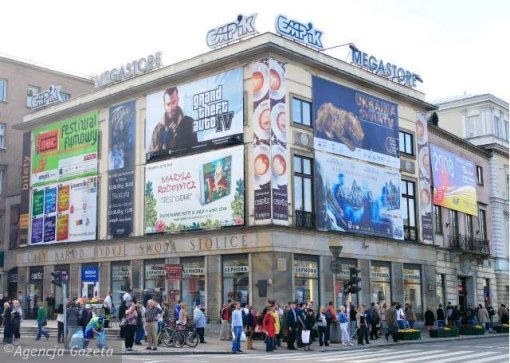

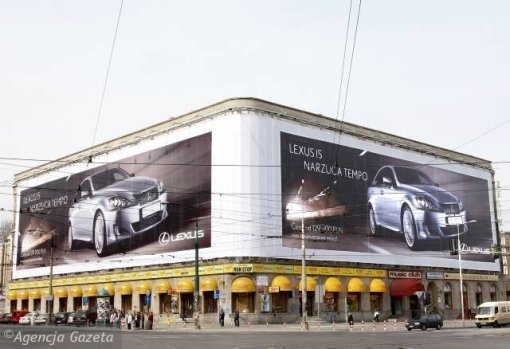

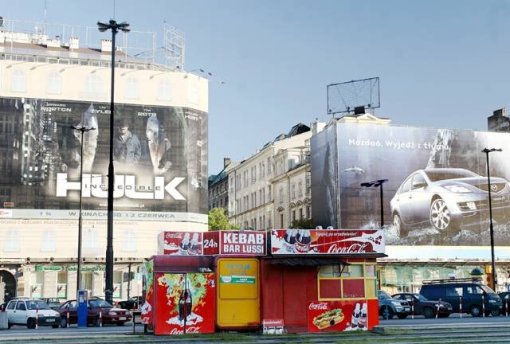


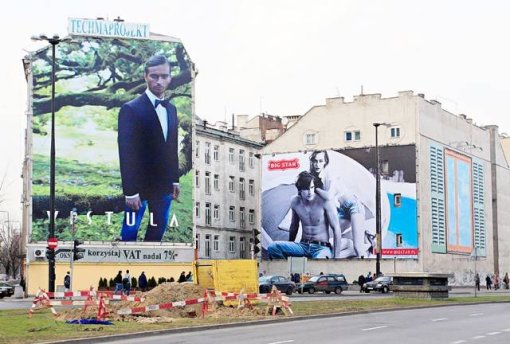

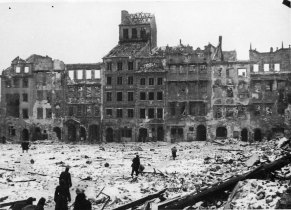
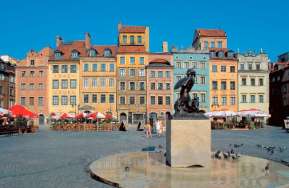
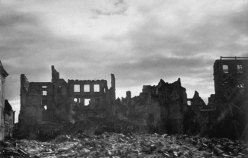





LAST 5 COMMENTS